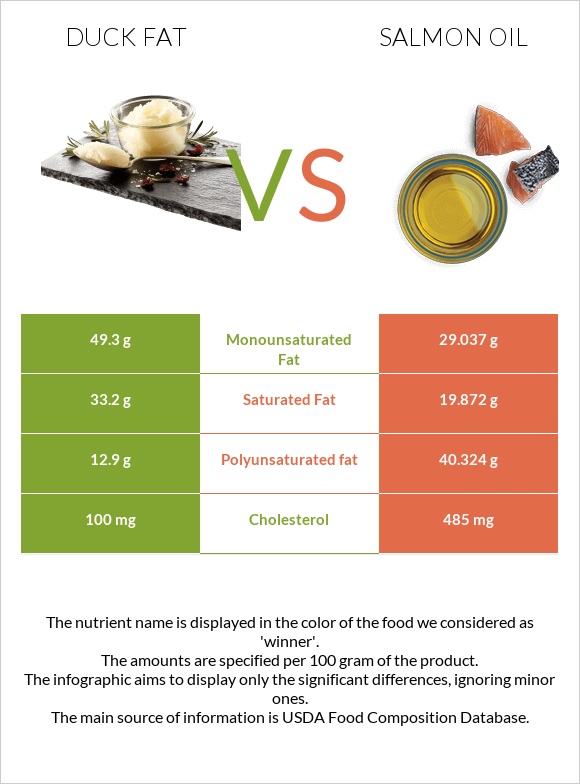Duck fat vs. Salmon oil — In-Depth Nutrition Comparison
Compare
What are the differences between duck fat and salmon oil?
- Duck fat is higher in monounsaturated fat, yet salmon oil is higher in polyunsaturated fat.
- Salmon oil's daily need coverage for cholesterol is 128% more.
- Duck fat has 2 times more monounsaturated fat than salmon oil. While duck fat has 49.3g of monounsaturated fat, salmon oil has only 29.037g.
- The amount of saturated fat in salmon oil is lower.
We used Fat, duck and Fish oil, salmon types in this article.
Infographic

Infographic link
Mineral Comparison
Mineral comparison score is based on the number of minerals by which one or the other food is richer. The "coverage" charts below show how much of the daily needs can be covered by 300 grams of the food.
| Contains more SeleniumSelenium | +∞% |
Vitamin Comparison
Vitamin comparison score is based on the number of vitamins by which one or the other food is richer. The "coverage" charts below show how much of the daily needs can be covered by 300 grams of the food.
| Contains more Vitamin EVitamin E | +∞% |
| Contains more Vitamin DVitamin D | +∞% |
All nutrients comparison - raw data values
| Nutrient |  |
 |
DV% diff. |
| Polyunsaturated fat | 12.9g | 40.324g | 183% |
| Cholesterol | 100mg | 485mg | 128% |
| Saturated fat | 33.2g | 19.872g | 61% |
| Monounsaturated fat | 49.3g | 29.037g | 51% |
| Vitamin D | 191 IU | 24% | |
| Vitamin D | 4.8µg | 24% | |
| Choline | 122.4mg | 22% | |
| Vitamin E | 2.7mg | 18% | |
| Calories | 882kcal | 902kcal | 1% |
| Fats | 99.8g | 100g | 0% |
| Selenium | 0.2µg | 0µg | 0% |
| Omega-3 - EPA | 0g | 13.023g | N/A |
| Omega-3 - DHA | 0g | 18.232g | N/A |
| Omega-3 - DPA | 0g | 2.991g | N/A |
Macronutrient Comparison
Macronutrient breakdown side-by-side comparison
Protein:
0 g
Fats:
99.8 g
Carbs:
0 g
Water:
0.2 g
Other:
0 g
Protein:
0 g
Fats:
100 g
Carbs:
0 g
Water:
0 g
Other:
0 g
| Contains more WaterWater | +∞% |
~equal in
Protein
~0g
~equal in
Fats
~100g
~equal in
Carbs
~0g
~equal in
Other
~0g
Fat Type Comparison
Fat type breakdown side-by-side comparison
Saturated fat:
Sat. Fat
33.2 g
Monounsaturated fat:
Mono. Fat
49.3 g
Polyunsaturated fat:
Poly. Fat
12.9 g
Saturated fat:
Sat. Fat
19.872 g
Monounsaturated fat:
Mono. Fat
29.037 g
Polyunsaturated fat:
Poly. Fat
40.324 g
| Contains more Mono. FatMonounsaturated fat | +69.8% |
| Contains less Sat. FatSaturated fat | -40.1% |
| Contains more Poly. FatPolyunsaturated fat | +212.6% |





